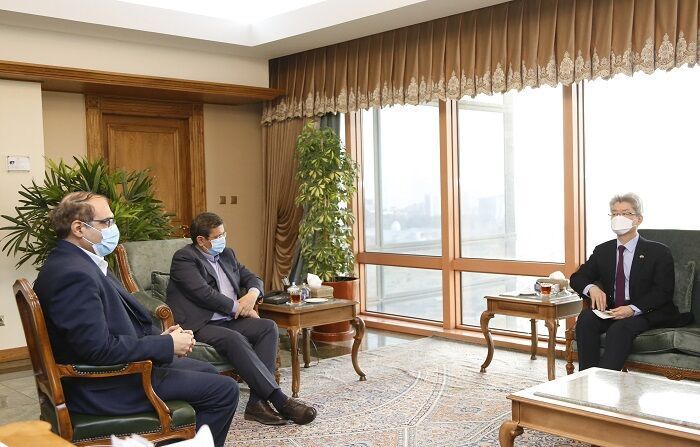 |
South Korean Ambassador to Iran Ryu Jeong-hyun (right) meets with Gov. Abdolnaser Hemmati of the Central Bank of Iran in the Korean Embassy in Tehran, in this photo captured from Iran's government website on Tuesday. |
The South Korean Foreign Ministry on Tuesday said unfreezing Iranian assets held in Korean banks would require prior approval from the US, denying Tehran’s claim that a deal had already been reached.
On Monday, Tehran announced that the two sides had reached an agreement on transferring the frozen Iranian assets to their desired destinations, during a discussion between Central Bank of Iran Gov. Abdolnaser Hemmati and Korean Ambassador to Iran Ryu Jeong-hyun.
According to the statement, the Korean ambassador said Seoul was prepared to take all the measures required to allow Tehran to have access to all of its frozen assets in Korea, adding “there is no limit and restriction in that regard.”
In response to the Iranian statement, the Foreign Ministry here said it was too early to call it a deal and that no actual agreement had been reached. “The two sides have been discussing various ways to release the funds,” a ministry official said. “While the two countries agreed on the ways and detailed scheme on how to transfer the assets, the actual release of the funds requires consultation with the US and its approval.”
Tehran is demanding that Seoul release about $7 billion in revenue from oil sales, which has been tied up in Korean banks since 2019 due to sanctions reimposed on Iran by the Donald Trump administration, after Washington’s unilateral decision to withdraw from the 2015 nuclear accord.
Seoul has been in talks with Washington on ways to unlock the funds without breaching the sanctions, including using some of the money to purchase humanitarian, medical and other supplies.
Earlier this month, Seoul said it was finalizing talks with Washington about using some of the funds to pay off Tehran’s UN membership fees, which are in arrears. Iran has agreed to this.
The two sides are also considering a payment mechanism known as the Swiss Humanitarian Trade Arrangement, which would allow Switzerland-based companies to send medicines and other vital goods to Iran with a US guarantee that the transactions would be processed without running afoul of US sanctions. But this method would also require consultations with the US.
The talks on the locked funds come as Tehran is withholding the release of a Korean-flagged vessel it seized in January. Tehran argues that it seized the ship and apprehended its sailors due to environmental pollution, but speculation has continued that it was done to pressure Seoul to unlock the funds.
Early this month, Iran agreed to free the crew of the oil tanker MT Hankuk Chemi, but decided to keep the vessel and its captain, who is to remain in Iranian custody until the investigation is completed into what the country calls a breach of its environmental pollution laws.
On Feb. 11, one of the 20 detained crew members was released and returned home for health reasons. For the remaining sailors, it is still uncertain when they will be able to leave Iran, as at least 13 crew members are required to be on board for the tanker to operate safely. Without the release of the vessel, it will be difficult for all of the sailors to go free.
The ministry said it is continuing consultations with Tehran for their prompt release.
By Ahn Sung-mi(
sahn@heraldcorp.com)








![[Today’s K-pop] Blackpink’s Jennie, Lisa invited to Coachella as solo acts](http://res.heraldm.com/phpwas/restmb_idxmake.php?idx=644&simg=/content/image/2024/11/21/20241121050099_0.jpg)